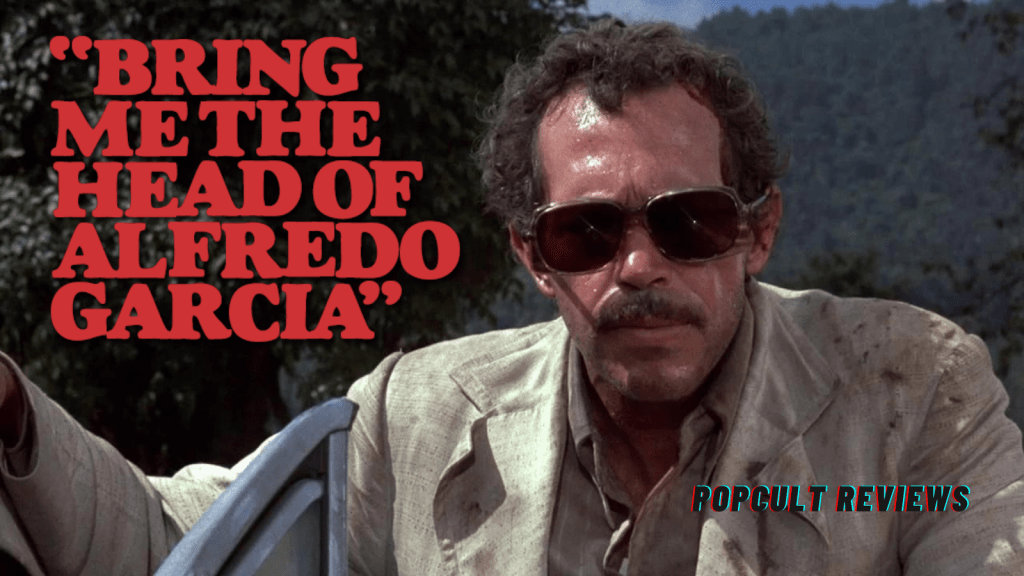Bring Me the Head of Alfredo Garcia (1974)
Written by Gordon Dawson, Sam Peckinpah, and Frank Kowalski
Directed by Sam Peckinpah
The films of Sam Peckinpah are violent and coarse. They were considered so shockingly gory that it led to X-ratings and bans in some places. Although they are relatively tame on a technical level by today’s standards, emotionally, there is still a lot of pain present in the work. Bring Me the Head of Alfredo Garcia came at the end of Peckinpah’s most fruitful period, and you can see it in the production quality. Pat Garrett and Billy the Kid was a box office failure, so the budget is less. Peckinpah was also known to be an alcoholic, and while the technical filmmaking is very tight here, the anger in the script feels like a seething drunk hunched over a typewriter, dripping with misanthropy for their fellow man.
Bennie (Warren Oates) is a piano player in a Mexican town. One day he’s approached by two men who say they are looking for Alfredo Garcia. The man has impregnated the teenage daughter of crime lord El Jefe. The big boss is offering big money to any man that brings him the scoundrel’s head. Bennie sees this as an opportunity to make it out of his dead-end job and recruits his on-and-off lover Elita (Isela Vega). She cheated on Bennie with Garcia when the latter man passed through town and knew where he was headed to. She’s heard he died in a car accident, so that’s that, right? Nope. Bennie sets on a road trip with his girl to dig up a corpse and use a machete to hack the head off.
One of Peckinpah’s constant gripes about making more mainstream films in the late 1960s and 1970s was not having a final cut. Instead, studios would hack apart his movies, attempting to soften the violence and muddling the themes. He wasn’t concerned with hits insomuch as they would create financing for his next venture. Most important was getting his bleak, angry vision of the world on the screen. Critics received Garcia with disdain and strong dislike because it is such pure undistilled Peckinpah. In interviews, the director said that this was exactly the movie he wanted to make, from conception to the final cut. Knowing this, we can explore his psyche and his view of us: the rest of the world.
Bennie is introduced to us as a less-than-savory character and precedes to experience a soul rot as he embarks on his macabre mission. There’s a moment early into the trip where two bikers approach Bennie and Elita. They make it clear they will rape her, and holding both of them at gunpoint, there’s not much the couple can do. Elita’s response to this was the most interesting to me. She is so apathetic about the situation, resigned to what will happen to her. Peckinpah films it to imply she may be into the act, but I think the actress was projecting something more world-weary. Elita is poor, she works as a maid, but she is aging and isn’t going to escape her situation. This isn’t the first time she’s been forced into sex, so she’s numbed herself. Elita shuts her brain off because she doesn’t want to die, and in this situation, that is the only other option.
With each further step in the journey, whatever might have been hopeful inside of Bennie is torn away. This culminates when he’s standing over Garcia’s corpse and hacking away with a machete. His mind is broken from that point on, and he acts with a singular purpose. Other people have lost all value to him; they aren’t human, life is worthless. So he drives down the highway, jabbering at the head, flies buzzing and gathering on the wet burlap sack. Bennie needs to carry this task through, he needs to make his sacrifices worth it, but we know this isn’t a story with a happy ending.
I can’t say what Peckinpah really felt about masculinity other than it has to have been complicated. From my perspective, this is a film that shows the real toxic, horrific ends that contemporary masculinity leads to. Bennie sees himself in a certain way, sarcastic, attempting to be cooler than he actually is, but we see him in the light of day. He is weak, self-hating, and ineffectual under the heel of other, more powerful, wealthier men. In many corners, Bennie is present in American culture, the disaffected, angry white male. He’s right to resent those in the upper echelons of the hierarchy but one of the ways he expresses this pain is by punching down on women and Mexican people. Bennie’s world is a surreal hyper-violent one where threats exist around every corner, the very definition of the reactionary worldview.
Bennie espouses early on that “nobody loses all the time,” a heartbreaking exaltation that he believes the wheel of fortune has to turn in his favor eventually. When you survey the modern blasted landscape of America, we see that idea expressed in some of the most broken people. They’ve been convinced to keep slogging through shit and enduring tortures because, eventually, you’ll win. Peckinpah says, “Fuck that!” The world, in his eyes, is a mire, pulling people under and leaving them to rot. This is both a reflection of the state of Western society but also the man’s personal demons. Alcoholism drug him under and ultimately destroyed him. People like Bennie and Peckinpah are fairly common, which makes the darkness of this film resonate so strongly.


2 thoughts on “Movie Review – Bring Me the Head of Alfredo Garcia”